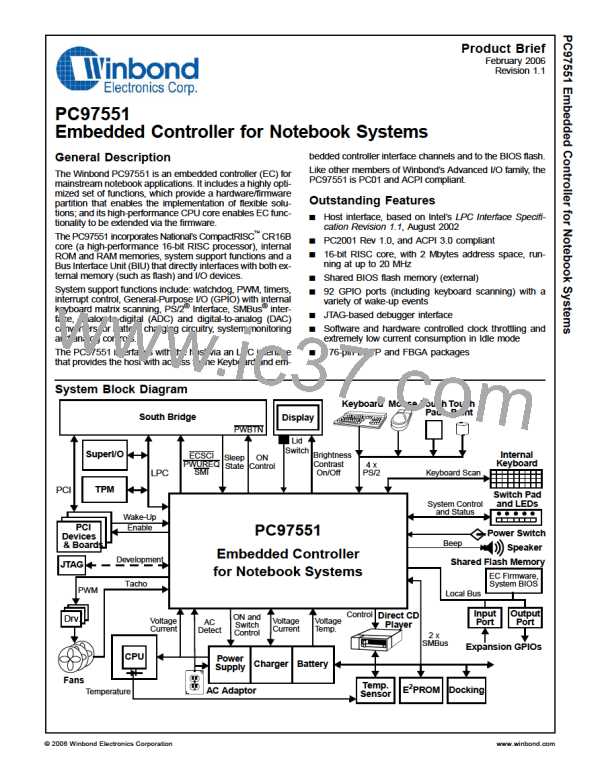Features (Continued)
— Provides interrupt on system events (via MSWC)
■ External modem ring on RI
■ Two 16-bit Multi Function Timer (MFT16) modules;
each module:
— Contains two 16-bit timers
— Supports Pulse Width Modulation (PWM), Capture
■ IRQ from Keyboard, Mouse and PM channels
■ Software-triggered event
and Counter
■ System ACPI sleep-state change
■ Power Button mode change
■ Timer and Watchdog (TWM)
— 16-bit periodic interrupt timer with 30 µs resolution
and 5-bit prescaler for system tick and periodic
wake-up tasks
■ Legacy software “Off” command
■ Multi-Input Wake-Up (MIWU)
— 8-bit watchdog timer
— Supports up to 20 wake-up inputs
— Provides user-selectable trigger conditions
■ Pulse Width Modulation (PWM) Module
— Eight outputs
— Provides wake-up on activity of external pins
■ General-purpose wake-up inputs
■ Power switch input
— 8/16-bit duty cycle resolution
— 8/16-bit common input clock prescaler
■ Analog to Digital Converter (ADC)
■ Keyboard scan inputs
— Five voltage channels (four external and one
— Generates wake-up event to Power Management
internal), with 8-bit resolution
Controller (PMC)
— Sigma-delta technology for high noise rejection
— Internal voltage reference
— Generates interrupts to ICU
■ General-Purpose I/O (GPIO)
— Every 100 ms, three of the five channels are measured
— 92 port pins (including keyboard scanning)
— I/O pins individually configured as input or output
— Optional internal pull-up resistors on inputs
— Special ports for internal keyboard matrix scanning
■ 16 open-collector outputs
■ Digital to Analog Converter (DAC)
— Four channels with 8-bit resolution
— Rail-to-Rail output range, from AGND to AVCC
— 1 µs conversion time
■ Eight Schmitt inputs with internal pull-ups
— Dedicated input for system On/Off switch
Host-Core Interface Functions
■ Host Bus Interface (HBI)
— External GPIO expansion through the
BIU I/O Expansion protocol
— Comprises three host interface ports, typically used
for KBC and ACPI EC channels:
■ PS/2 Interface
■ One 8042 KBC-standard, interface (legacy 6016
,
— Supports four external ports for: external keyboard,
6416).
mouse and two additional pointing devices
■ Two PM interface ports (legacy 6216, 6616 and
— Supports byte-level handling via hardware accelera-
6816, 6C16).
tor
These provide ACPI Embedded Controller sup-
port with either “Shared” or “Private” interface
(regarding SCI/SMI generation).
■ Two ACB Interface modules. Each module:
— Is Intel SMBus and Philips I2C® compatible
— Is SMBus master and slave
— Generates IRQ (with Legacy support), SMI and SCI
— Detects four simultaneous slave addresses (two
— Provides Fast Gate A20 and Fast Keyboard Reset
user-defined, broadcast and ARP)
via firmware
— Supports polling and interrupt controlled operation
■ Core Access to Host-Controlled Functions
— Host-Core arbitration of function control
— Host access blocked by the core via lock bits
— Generates a wake-up event on detection of a Start
Condition (while in Idle mode)
— Has an optional internal pull-up on SDA and SCL pins
■ Universal Synchronous/Asynchronous Receiver-Trans-
mitter (USART)
— Supports full-duplex USART communication
— Has programmable baud rate
— Supports polling and interrupt controlled data transfer
— Supports synchronous mode with either internal or
external clock
— Supports 9-bit Attention mode
Revision 1.1
3
www.winbond.com

 WINBOND [ WINBOND ]
WINBOND [ WINBOND ]